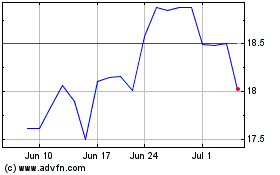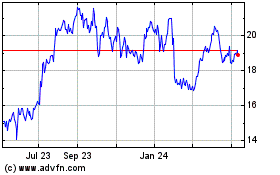U.S. Regulators Warn Drillers to Find Solution to Subsea Bolt Failures
August 29 2016 - 1:33PM
Dow Jones News
By Ted Mann
Federal regulators Monday warned subsea oil drillers and
equipment makers that bolt failures in the Gulf of Mexico could
result in an oil spill on the scale of the Deepwater Horizon
disaster.
"Fortunately, as of today we've had no major catastrophes from
bolt failures," said Brian Salerno, director of the Bureau of
Safety and Environmental Enforcement at the Department of the
Interior, which oversees the offshore oil industry. "We believe it
may only be a matter of time before our luck runs out."
The warning came at a public forum Monday at the Interior
Department in Washington convened by the BSEE. The agency's working
group and a parallel task force set up by an oil industry trade
group are trying to determine why critical metal fasteners have
corroded and failed in recent years.
Regulators and makers of oil production equipment, including
General Electric Co., Schlumberger Ltd. and National Oilwell Varco
Inc., are trying to determine what is causing the failures, which
have included premature corroding, stripping of threads or snapping
outright. The problems have been found over the past four years on
safety equipment in underwater oil production, including on blowout
preventers, which are designed as a last defense against a major
oil spill like the Deepwater Horizon incident in the Gulf of
Mexico.
"We could have another Macondo or something similar from this
piece of equipment," said Joe Levine, a BSEE official, referring to
the name of the well that blew out in 2010, killing 11 workers and
releasing millions of barrels of oil into the gulf over almost
three months.
Dr. Marcia McNutt, the president of the National Academy of
Sciences, compared the risk of a bolt failure leading to a major
oil spill to the failure of an O-ring that doomed the space shuttle
Challenger, which exploded after takeoff in 1986.
The American Petroleum Institute, a trade group that sets
industry standards, has said it is working with regulators to
determine the reason for the bolt failures. Equipment manufacturers
say they too are searching for answers.
In 2013, GE recalled more than 10,000 bolts after a failure on
one of its components, a blowout preventer connector, which led to
a spill of more than 400 barrels of drilling fluid in the Gulf of
Mexico.
The company and regulators have previously said that a variety
of factors could have caused those failures, including
metallurgical issues with the alloy used in the bolts themselves,
as well as "over-torquing" of the fasteners during the assembly of
the stacks of equipment that sit atop the subsea well.
BSEE officials said a new well-safety rule, passed in response
to the Deepwater Horizon, that requires oil producers to report the
failures to the government, even when an oil spill doesn't occur,
will help the agency better understand the bolt problems.
U.S. regulators said they have contacted counterparts in other
countries to alert them to their concerns about the failures. Troy
Trosclair, a BSEE supervisor for the Gulf of Mexico region, said
Brazilian officials reported that 56 rigs working for Petróleo
Brasileiro SA, or Petrobras, that country's biggest oil producer,
were affected by the 2013 GE recall.
Write to Ted Mann at ted.mann@wsj.com
(END) Dow Jones Newswires
August 29, 2016 13:18 ET (17:18 GMT)
Copyright (c) 2016 Dow Jones & Company, Inc.
NOV (NYSE:NOV)
Historical Stock Chart
From Mar 2024 to Apr 2024

NOV (NYSE:NOV)
Historical Stock Chart
From Apr 2023 to Apr 2024
